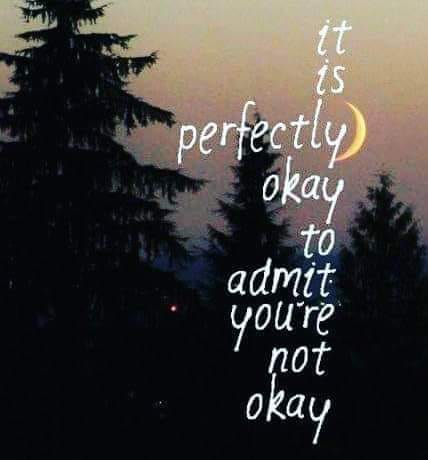We hear it all the time, but do we actually believe it?

It’s ok not to be ok. This is something we hear repeated over and over, especially in recent times when mental health awareness is becoming more acceptable. It’s a reminder that we don’t always have to have it together, and that it’s perfectly normal to feel overwhelmed, anxious, or depressed at times. But while we may tell this to other people, it’s often hard to believe it ourselves. I know it is for me.
Why is that? Why is it easier to accept that others may be struggling, but not ourselves? There could be several reasons for this. We’ve been conditioned to believe that we have to be strong and have everything figured out. Some people may fear being judged or stigmatised if we admit to not feeling okay. Others simply don’t want to burden others with problems.
Whatever the reason may be, it’s important to recognise that it’s okay to not be okay, no matter who you are or your reasons why. It’s a basic human experience to go through ups and downs, and we all have moments where we feel lost, helpless, or overwhelmed. It doesn’t make us weak or flawed, it makes us human.
The next step is to actually believe it. This can be a challenge, especially if we’ve been telling ourselves the opposite for a long time. But it’s not impossible. It starts with small steps, like acknowledging your emotions and giving yourself permission to feel them. Instead of pushing them away or trying to distract yourself, try to sit with them and observe them. You don’t have to act on them or solve them, just let them be. But this feels so difficult when you’re struggling. I know it does for me. All this stuff sounds pretty good in theory but how the hell do we practice it?
A helpful strategy is to practice self-compassion. This means treating yourself with the same kindness and understanding that you would offer to a friend who is struggling. It involves recognising that it’s okay to make mistakes, that you’re doing the best you can, and that you deserve love and care just as much as anyone else. I try to put myself in the position of the person who means most to me. My 9 year old niece. Would I treat her the way I treat myself? Absolutely not. How would I feel if I knew she was talking to herself the way I talk to myself? The truth is that I would be absolutely devastated.
So even when I don’t feel like treating myself with compassion, I think of that 9 year old niece who I care about so much. I try to put myself in her shoes. To treat myself the way I want her to be treated because as I’m not ready to treat myself in such a deserved way, than maybe I can treat myself the way I want her to be treated.
It’s also important to remind myself that seeking help is a sign of strength, not weakness. Whether it’s talking to a counsellor, reaching out to a friend, or reaching out to an online support group, there are many resources available to help you navigate difficult times. It’s okay to ask for help, and it’s okay to accept it when it’s offered.
It’s important to keep reminding yourself that it’s ok not to be ok. This may feel like a mantra that you’re repeating without believing it at first, but with time and practice, it can become a natural part of your thinking. And when you start to truly believe it, you can pass your wisdom on to someone else.
Tweet
It’s ok not to be ok. It’s a simple statement, but one that can be hard to internalise. But by practicing self-compassion, or by treating yourself with the compassion that you treat others with, and seeking help when needed, and reminding ourselves that we’re not alone in our struggles, we can start to believe it. And when we do, we can offer ourselves and others the kindness and understanding that we all deserve. Even if we’re only going through the motions for now. Eventually it will become easier and we won’t even realise we’re doing it.
